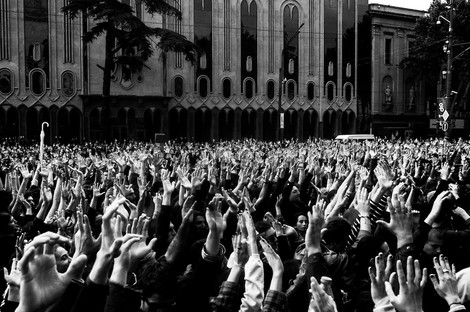Your podcast discovery platform
Curious minds select the most fascinating podcasts from around the world. Discover hand-piqd audio recommendations on your favorite topics.

piqer for: Globalization and politics Global finds
Neil Hauer is an independent analyst focused on Syria, Russia, and the Caucasus. Based in Tbilisi, Georgia, he served as senior intelligence analyst at The SecDev Group, an Ottawa-based geopolitical risk consultancy, for three years. He is presently engaged primarily on Russia’s role in the Syrian conflict.
Bassiani's Come Down: The Rise And Fall Of White Noise And Tbilisi's #Raveolution
May 12th and 13th of this year were heady days in Tbilisi, as anyone who lived through them will remember. Special forces raids on a pair of high-profile nightclubs in Georgia's capital triggered a wave of ecstatic protests by Tbilisi's young liberal crowd, only to turn to something much darker when the far right gathered its forces for counterdemonstrations that nearly turned to violence the next day. William Dunbar gives a much-needed update on what has happened since.
The nightclub raids in mid-May were the outcome of several years of increased official harassment against clubbers. Police would follow patrons exiting the establishments and drag them to the local station for drug tests, a policy that has contributed to Georgia having the largest prison population in Europe (a third of which is those jailed for drug offences).
The White Noise movement was formed in response to these techniques. Activists such as founder Naja Orashvili began trailing police on their post-club raids, accompanying the detainees to the police station to ensure their release (as their detention was illegal under Georgia's constitution) and later returning back to the nightclub Bassiani with them the same night. This increased the visibility of their efforts and spread public knowledge of police abuse in these situations.
Unfortunately, the optimism of the initial May 12th protests has fizzled out. While Georgia's government promised reforms on drug policy in exchange for protesters (who were then under threat by right-wing mobs) leaving the square, these have since failed to materialize. Nevertheless, the demonstrations showed the strength of Georgia's civil society and the political cost to the government of such raids.
This piece would benefit from a follow-up exploring the wider schisms in Georgian society, i.e. those who joined the Bassiani protests not for drug policy, but against official abuses in general. Nevertheless, it is an illuminating exploration of these events.
